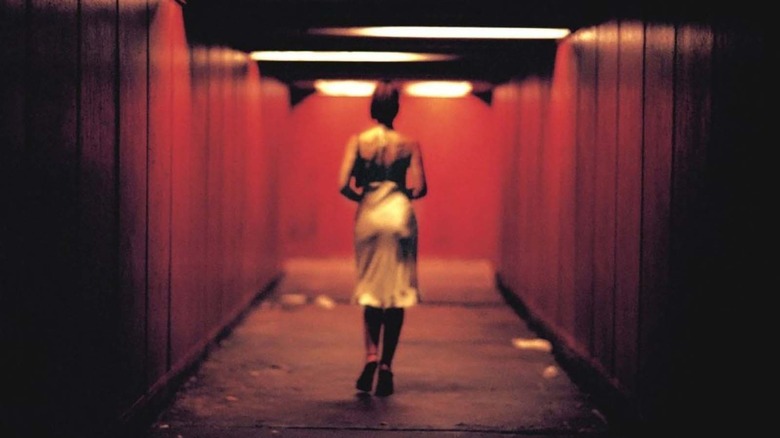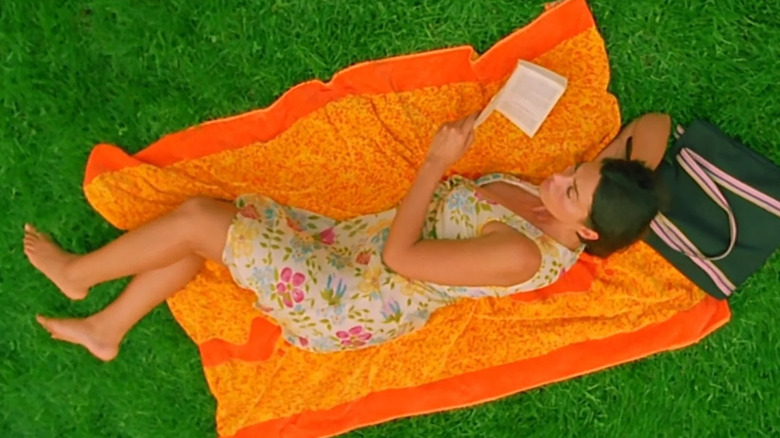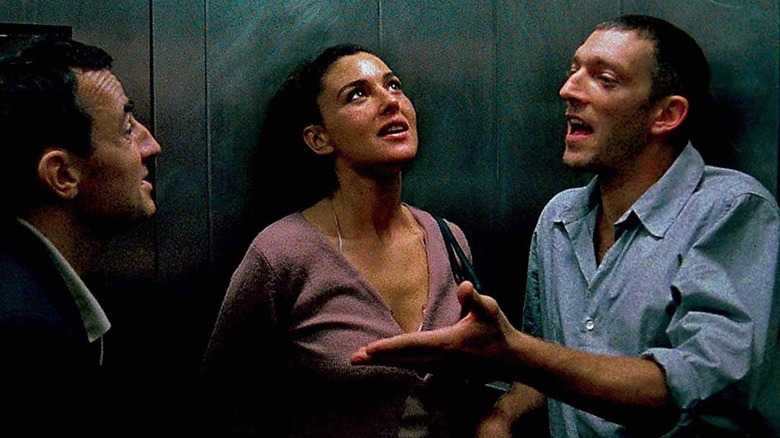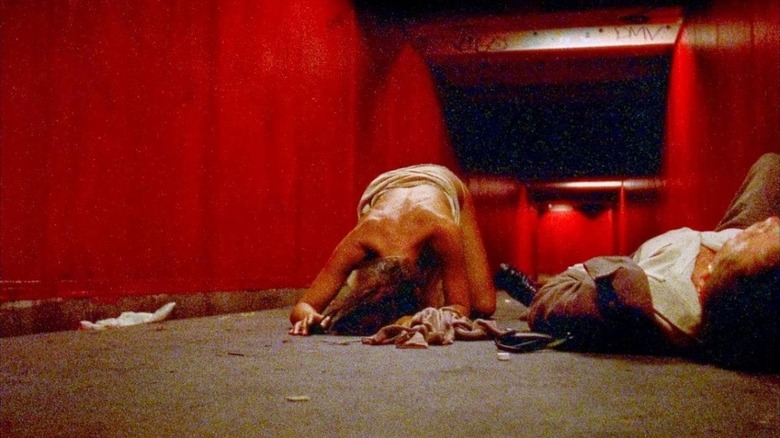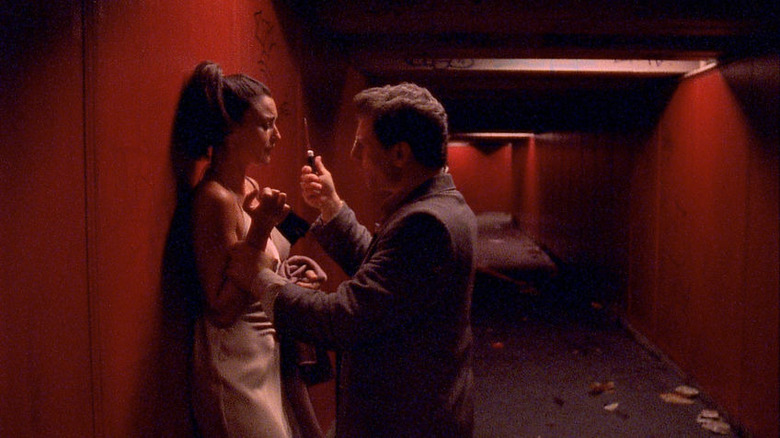Irreversible Straight Cut Review: Gaspar Noe's Brutal Tale Is Effective No Matter How It's Told [Brooklyn Horror Film Festival]
The reputation of Gaspar Noé's nightmare revenge film "Irreversible" precedes it. As a cornerstone of the New French Extremity movement of the late 1990s and 2000s, its legacy looms large in audiences' minds as a worthy entry too brutal for a second viewing. I took one for the team, though, and subjected myself to a second viewing of this depravity in the form of a new cut for the film's 20th anniversary. Fortunately, last week's Brooklyn Horror Film Festival screening wasn't a fruitless one, as watching the movie more than once just for fun feels like an entirely masochistic task.
But I sat down with purpose for something wholly different yet achingly the same, something that reframes the work in your mind but doesn't force any frills down your throat. Ultimately, the self-proclaimed "straight cut" of the film — a sequentially chronological cut that presents the story in narrative order — has a more distinct clarity, giving a fuller understanding of the story audiences are forced to decipher on their own in the original. It's more effective in some scenes, but just as torturous across the board in the way reexamines both our cruelest and most tender impulses. If you can stomach a second sitting of Noe's thesis, seeing this film — originally cut in reverse — in chronological order is a must.
"Irreversible" follows the story of Marcus (Vincent Cassel) and Pierre (Albert Dupontel), two men who descend into the seedy Paris night to enact revenge on the man who mercilessly beat and raped Marcus' girlfriend, Alex (Monica Bellucci). As emotional as it is disturbing, the movie documents one evening where bonds are tested, fate intervenes, and lives are made utterly irreparable in an instant.
A whole new, heartbreaking beginning
The thing about the juxtaposing cuts of this story is that they are both savagely effective but certain scenes become stronger when placed in the narrative a certain way. Some hit the audience harder in the original cut and others in the straight cut. Innocence is imbued in this new cut — whereas it is bestowed in the original cut — all because of the way Alex is introduced. In the Straight Cut, we meet Alex as she lounges in a park, a shiny new penny of a woman full of life and curiosity. She's the picture of natural innocence at that moment, something untouched and untainted.
This permeates our first impression of her. But when we meet her in the original, she is entirely unrecognizable in the aftermath of the crimes committed against her, and we immediately find her innocence in the brutality of those crimes. In the new cut, one of Alex's lines rings out in the film's opening sequence, and it echoes throughout the events of the film, while in the original cut it nearly acts as a cruel epigraph. "I made all the decisions," she says after the audience has been destabilized by a spinning shot of children playing in a sprinkler underscored by a sweeping, dark orchestral herald. The words, the shots, and the music — they foreshadow here as much as they press the knife deeper in the original. The world is spinning out of control, leading into a loss of innocence. There are several dual-acting scenes like this that shift depending on how you view the story.
Building the inner life
In the Straight Cut, we meet Marcus and Pierre from an uneventful standpoint rather than catching them in the throes of vengeful murder, and because of this, we become invested in these characters as a unit as well as individuals. Their group dynamic establishes Marcus and Pierre's relationship through a playful give-and-take with Alex at the center, an opportunity to show her inner life. It saves her from becoming a throwaway character despite how the story resumes without her after the attack and shows where the straight cut has an advantage over the original.
Similarly, the film's final acts — which were originally its opening acts — end up being more haunting in their repurpose as a conclusion. It plays as a haunted house, a terrifying rabbit hole through which Marcus frantically searches for Alex's assailant. This cut's ending proves itself to be more effective because the audience has a clear knowledge, unmarred from the struggle of trying to catch up in medias res, that Marcus and Pierre attack and murder the wrong man, a detail that makes your stomach sink. It's mandatory to clock that moment to feel the breadth of debased misfortune this film wants you to feel, and it's best served through this straight cut.
An unchanging, unflinching brutality
However, there are also elements of the story that are devastating no matter the shape of the story. How are you supposed to choose which is more crushing, finding out Alex was pregnant prior to experiencing the rape sequence or after? They are both harrowing, and soul-killing in their mere suggestion, let alone how we witness the act in its entirety. The scene is just as vile as it has always been, and there is nothing quite like watching a completely shattered Alex try to escape her attacker after he has seemingly finished his assault, dragging her body across the ground with her head hung low. She almost looks like something Lovecraftian, a monstrous thing reduced to nothing but a primal mass in search of survival and safety. The image is almost as unsettling and dark as the actual acts of violence within the film, and no matter which cut, it will stay with me forever.
From drama comes horror
This cut also illuminates how the dramatic aspects of this film work towards its most crushing elements. According to Eric Thirteen, a cinematographer who introduced the straight cut at the festival screening I saw, movies like "Irreversible" and other New French Extremity staples were originally looked at as dramas in France. Later, they were considered differently in America, using their strong fears of the "other" and the ways we can be pitted against one another even when there is little reason for it. Those fears feel uniquely American today, but pervade French culture in much the same stroke. Noé's film is a high drama about the ways we both connect and refuse to do so, refusing to see others for what they truly are: just people, trying to live in the best way they can.
In the same vein, the straight cut's epilogue is a brilliant dramatic tool that becomes an important final spotlight on sexual violence and its irreversible effects. As the film's original opening, it played as a harbinger of horrors to come. In reverse, it is an epitaph for a broken soul, a harsh and unflinching reminder that "time destroys everything." It's the sentiment Noé wants us to take away once we turn off the television or leave the theater. In this new cut of Noé's sickeningly masterful message, it's hard not to.
